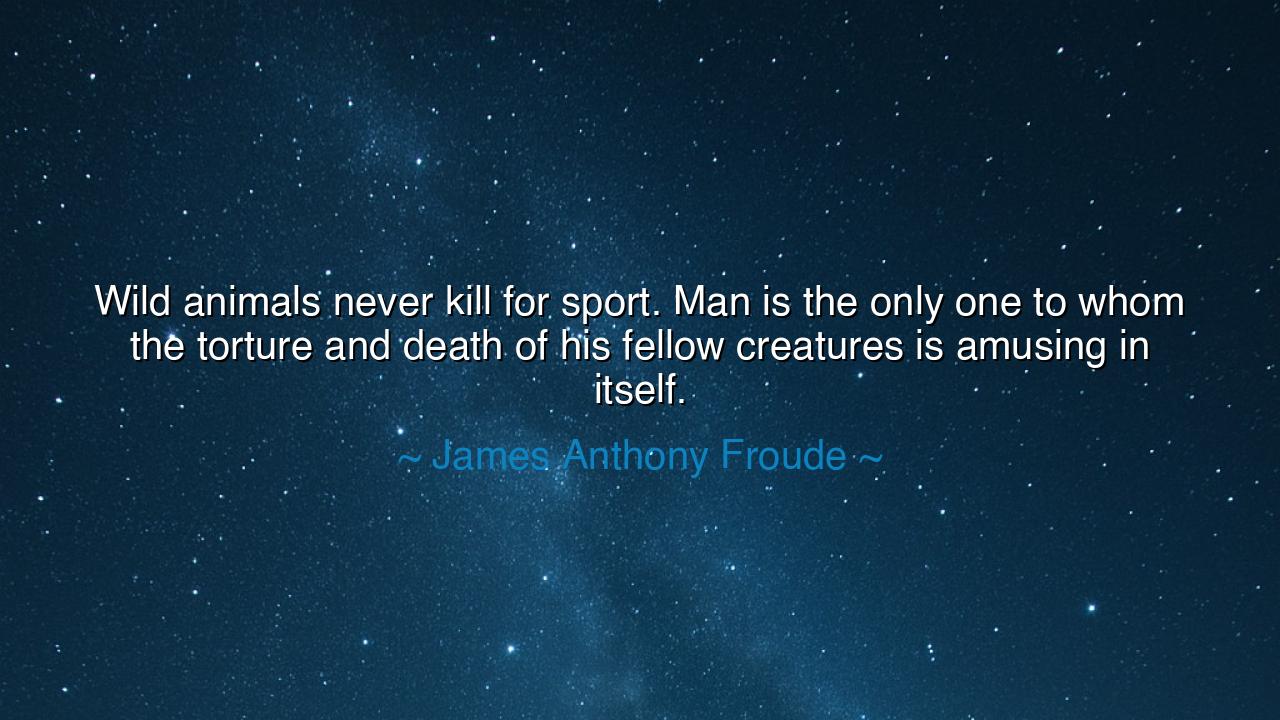
Wild animals never kill for sport. Man is the only one to whom
Wild animals never kill for sport. Man is the only one to whom the torture and death of his fellow creatures is amusing in itself.






“Wild animals never kill for sport. Man is the only one to whom the torture and death of his fellow creatures is amusing in itself.” — thus spoke James Anthony Froude, with the sorrow of one who has gazed too long upon the cruelty of humankind. His words fall like iron upon the heart, for they hold both accusation and lamentation. Beneath them lies a truth that has shadowed mankind since the dawn: that of all living beings under the sun, only man delights in destruction for its own sake. The lion kills to eat; the hawk strikes to survive. But man, with his cunning and his conscience, often kills to feel his own power, to watch suffering as though it were a mirror of his might.
In the wild, there is no malice. The wolf takes the lamb because hunger gnaws at its belly, not because pleasure gnaws at its soul. Nature’s law is harsh but pure — the strong feed upon the weak, yet no beast rejoices in agony. Only man, born with the gift of reason and burdened with imagination, has twisted both into tools of cruelty. He paints his violence with words like “sport,” “honor,” or “entertainment,” disguising the abyss within. The ancient arenas of Rome knew this well — where lions were not the savages, but the spectators were. Beneath the roar of the crowd, the blood of slaves and beasts mingled in the dust, and civilization called it triumph.
Consider the tale of the Colosseum, that mighty ring of marble and death. There, under the eyes of emperors and children alike, men were thrown to beasts not for justice, not for hunger, but for amusement. It was said that when the lions tore through the condemned, the crowd rose to its feet in thunderous joy — as though cruelty were a kind of beauty. And thus, the beasts, who killed from instinct, became more innocent than their masters. Froude’s truth echoes through those ruins still: that in man’s laughter over another’s pain, there is a fall far deeper than any animal’s hunger — a descent into the hell that he himself creates.
And yet, let us not think this evil confined to the past. The colosseums have only changed their shape. Today they glow with screens and hum with machinery, but the spectacle endures — cruelty disguised as entertainment, mockery made of suffering. We kill not only with weapons, but with words, with indifference, with ridicule. The ancient sword has become the tongue, and still the same darkness delights in domination. Humanity, armed with reason, has not yet learned that compassion, not conquest, marks the measure of greatness.
But there is a deeper wound beneath Froude’s lament. For he does not only condemn; he mourns the loss of innocence. Once, man walked among the beasts and learned from them — learned how to live, how to hunt, how to survive. Yet when he rose, when he gained knowledge and fire and dominion, he forgot the sacred balance. He turned his gifts inward, waging war not on hunger but on his own kin, on creatures weaker than himself. And in doing so, he lost something of the divine. The beast kills to live; man kills to feel alive — and in that reversal lies his fall from grace.
Still, all is not lost. Within every person flickers the old mercy, the memory of the covenant between creature and creation. We see it when a child rescues a bird, when a stranger feeds the hungry dog, when a nation fights to protect the wild forests from its own greed. These acts, though small, are sparks of redemption. They remind us that the true strength of humanity lies not in its power to destroy, but in its ability to protect. The beasts need no laws to act with purpose; it is man who must relearn restraint and reverence, who must make his reason serve compassion rather than cruelty.
Therefore, my listener, take this lesson into your heart: to be truly human is to guard life, not to mock it. When you encounter the weak, the voiceless, the fragile — whether beast or brother — remember that how you treat them defines the worth of your soul. Turn your cleverness toward kindness, and your strength toward mercy. Refuse the laughter of cruelty, for it is the laughter of decay. Instead, be as the shepherd, not the hunter of hearts. For in a world where man is the only creature capable of torture for sport, let him also be the only one capable of mercy for its own sake.
And so, walk gently in this world of living things. The beasts of the field harm none unless they must; be as wise as they are fierce, as tender as they are wild. Let no amusement come from pain, no pride from dominance. Then, and only then, shall we rise again above the beasts — not in power, but in purity. For the mark of our true evolution is not in how high we climb, but in how softly we tread upon the earth.






AAdministratorAdministrator
Welcome, honored guests. Please leave a comment, we will respond soon